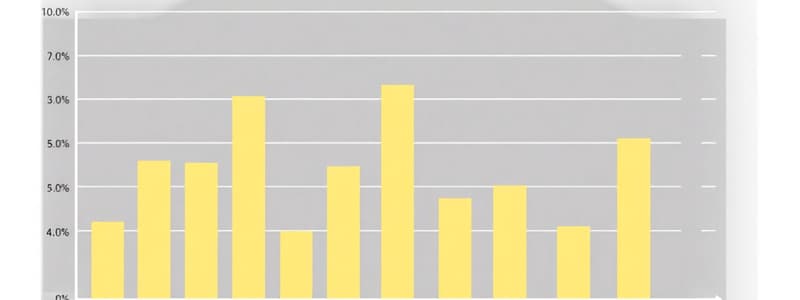Podcast
Questions and Answers
Which measure of central tendency is defined as the most frequently occurring observation in quantitative data?
Which measure of central tendency is defined as the most frequently occurring observation in quantitative data?
What is the correct formula for calculating the mean?
What is the correct formula for calculating the mean?
Standard deviation is calculated by taking the square root of which of the following?
Standard deviation is calculated by taking the square root of which of the following?
Which statement is correct regarding the mean in qualitative data?
Which statement is correct regarding the mean in qualitative data?
Signup and view all the answers
If the sample data is {10, 12, 14, 15, 17, 18, 18, 24}, what is the median of the data?
If the sample data is {10, 12, 14, 15, 17, 18, 18, 24}, what is the median of the data?
Signup and view all the answers
What is the primary purpose of descriptive statistics?
What is the primary purpose of descriptive statistics?
Signup and view all the answers
Which example best illustrates inferential statistics?
Which example best illustrates inferential statistics?
Signup and view all the answers
What type of data is a qualitative variable?
What type of data is a qualitative variable?
Signup and view all the answers
Which of the following is an example of a discrete variable?
Which of the following is an example of a discrete variable?
Signup and view all the answers
How does inferential statistics typically utilize sample data?
How does inferential statistics typically utilize sample data?
Signup and view all the answers
What is a common misconception about descriptive statistics?
What is a common misconception about descriptive statistics?
Signup and view all the answers
Which statement correctly describes the relationship between variables in inferential statistics?
Which statement correctly describes the relationship between variables in inferential statistics?
Signup and view all the answers
Which statement best exemplifies the role of data in statistical research?
Which statement best exemplifies the role of data in statistical research?
Signup and view all the answers
Which of the following variables is considered qualitative?
Which of the following variables is considered qualitative?
Signup and view all the answers
What type of sampling method involves selecting members so that each has an equal chance of being selected?
What type of sampling method involves selecting members so that each has an equal chance of being selected?
Signup and view all the answers
Which of the following is an example of a quantitative discrete variable?
Which of the following is an example of a quantitative discrete variable?
Signup and view all the answers
What is defined as a value that describes an aspect of a sample?
What is defined as a value that describes an aspect of a sample?
Signup and view all the answers
Which variable is classified as quantitative continuous?
Which variable is classified as quantitative continuous?
Signup and view all the answers
In which sampling method are populations divided into smaller groups called clusters?
In which sampling method are populations divided into smaller groups called clusters?
Signup and view all the answers
Which type of variable would encompass characteristics like gender and hair color?
Which type of variable would encompass characteristics like gender and hair color?
Signup and view all the answers
What type of error is caused by factors not related to the sampling process?
What type of error is caused by factors not related to the sampling process?
Signup and view all the answers
What is the required font size for the research proposal document?
What is the required font size for the research proposal document?
Signup and view all the answers
How should the research proposal be formatted in terms of margins?
How should the research proposal be formatted in terms of margins?
Signup and view all the answers
What is the maximum length allowed for the research proposal document?
What is the maximum length allowed for the research proposal document?
Signup and view all the answers
Which citation style must be used for the research proposal?
Which citation style must be used for the research proposal?
Signup and view all the answers
In what format should the proposal document be submitted?
In what format should the proposal document be submitted?
Signup and view all the answers
What percentage of group members must participate in the video presentation?
What percentage of group members must participate in the video presentation?
Signup and view all the answers
How many points is allocated for the research methodology in the rubric?
How many points is allocated for the research methodology in the rubric?
Signup and view all the answers
What element is NOT included in the scoring rubric for the research proposal?
What element is NOT included in the scoring rubric for the research proposal?
Signup and view all the answers
What must the proposed research title not exceed in length?
What must the proposed research title not exceed in length?
Signup and view all the answers
Which section explains the justification for conducting the study?
Which section explains the justification for conducting the study?
Signup and view all the answers
What is required in the 'Brief Review of Related Literature & Studies' section?
What is required in the 'Brief Review of Related Literature & Studies' section?
Signup and view all the answers
Which of the following is NOT included in the methodology section?
Which of the following is NOT included in the methodology section?
Signup and view all the answers
What type of research design should be specified in the methodology?
What type of research design should be specified in the methodology?
Signup and view all the answers
Which of the following is an example of a method of data collection?
Which of the following is an example of a method of data collection?
Signup and view all the answers
In the context of research proposals, what does 'ethical consideration' refer to?
In the context of research proposals, what does 'ethical consideration' refer to?
Signup and view all the answers
What citation style should references follow in the proposal?
What citation style should references follow in the proposal?
Signup and view all the answers
What type of data is the speed of a car classified as?
What type of data is the speed of a car classified as?
Signup and view all the answers
Which method of data collection involves gathering information directly from subjects?
Which method of data collection involves gathering information directly from subjects?
Signup and view all the answers
Which of the following is a characteristic of interval data?
Which of the following is a characteristic of interval data?
Signup and view all the answers
What type of data is the college entrance test result classified as?
What type of data is the college entrance test result classified as?
Signup and view all the answers
Which measure of central tendency represents the most frequently occurring value?
Which measure of central tendency represents the most frequently occurring value?
Signup and view all the answers
Which of the following is NOT a method of presenting data?
Which of the following is NOT a method of presenting data?
Signup and view all the answers
What type of source is created by the researcher themselves?
What type of source is created by the researcher themselves?
Signup and view all the answers
Which measure of variability indicates the distance from the lowest to the highest data points?
Which measure of variability indicates the distance from the lowest to the highest data points?
Signup and view all the answers
Study Notes
Course Information
- Course title: Statistics
- Instructor: Engr. Maria Cristina A. Sicat
- Institution: Holy Angel University
Midterm Project Requirements
- Research Proposal with Video Presentation
- Work in a group of up to four students
- Research proposal for a study that contributes to a solution of a social, economic, or cultural problem (including educational)
- Use of statistical methods for data processing and analysis
- Output is a document and a video presentation
Research Proposal Requirements
- Proposed Research Title (max 15 words)
- Rationale for the study
- Statement of the Problem (research questions)
- Review of Related Literature and Studies (minimum 10 references within 10 years)
- Methodology (specific quantitative research design)
- Sample and Sampling Technique
- Data to be collected
- Methods of data collection (e.g., survey, interviews)
- Research Instrument
- Data Analysis (descriptive and inferential tools)
- Ethical Considerations
- References (APA 7th edition)
- Appendix (draft of the research instrument)
Document File Requirements
- 15-20 pages in letter size paper
- APA 7th edition format for in-text citations and references
- 1-inch margins
- Double spacing
- Times New Roman or Arial font (size 12)
Presentation Requirements
- Presentation in a recorded video (5-10 minutes)
- All required content to be covered
- Participation of at least 50% of the group members.
- Introduction of group members by name and section at the start of the presentation
- Indicate individual contributions
- Upload the video on YouTube (unlisted)
- Post the YouTube link in the online platform's comment section
- Use provided rubric for guidance
Rubric Details
- Rubric for scoring the research proposal (out of 60 points)
- Contains criteria such as paper focus, research questions, methodology, proposed statistical analysis, appendix, appropriate citations, style/delivery, content/organization, team collaboration
Statistics as a Branch of Mathematics
- A branch of mathematics
- Deals with scientific collection, organization, presentation, analysis, and interpretation of data
- Aims to gain meaningful insights from data
Two Areas of Statistics
- Descriptive Statistics
- Inferential Statistics
Descriptive Statistics
- Methods for collecting, describing (organizing, presenting, summarizing), and analyzing data without drawing conclusions for a large group
- Examples include calculating the average, creating charts, and summarizing data.
Inferential Statistics
- Methods used to draw conclusions, make predictions, or forecast about an entire set of data based on a sample.
- Examples include testing hypotheses about a population, making estimates about the population from a sample, making predictions about the future.
Example of Descriptive Statistics
- Presenting the Filipino population by constructing a graph indicating the total number, by age and gender, based on the 2000 census.
Example of Inferential Statistics
- Testing a new milk formula to see if it improves psychomotor development in infants.
Exercise (Descriptive/Inferential Statistics in Scenarios)
- Scenarios that illustrate when particular statistical methods would be used to ascertain whether descriptive or inferential statistics would be used.
Statistical Terminologies
- Data: Pieces of information useful for researchers
- Variable: Characteristic or property measured in a study -Quantitative Variable: Measurable with numerical values -Discrete: Counted (e.g., number of students) -Continuous: Measured (e.g., height) -Qualitative Variable: Categorical (e.g., gender, hair color)
- Individuals: People or objects in a study
- Population: The entire group of interest
- Sample: Part of the population
- Parameter: Value describing a population
- Statistic: Value describing a sample
Types of Variables
- Qualitative (categorical): Gender,Hair Color, etc
- Quantitative (numerical): -Discrete (counted): Number of students -Continuous (measured): Height, Weight
Exercise: Identifying Variables (Qualitative/Quantitative)
- Examples of variables and determining if they are qualitative or quantitative, and if quantitative, whether discrete or continuous.
Statistical Terminologies (Population, Sample, Parameter, Statistic)
- Population: Entire group of interest
- Sample: Part of the population
- Parameter: Value describing a population
- Statistic: Value describing a sample
Sampling Methods
- Random Sampling (probability sampling): Each member of the population has an equal chance of being selected.
- Nonrandom (non-probability sampling) -Purposive sampling -Quota Sampling -Convenience sampling -Snowball method
- Sampling errors -Actual process of sampling creates errors -Sample may not be large enough or representative of the population
- Non-sampling errors -Errors outside the sampling process, such as faulty equipment
Random Sampling Methods
- Simple Random Sampling: Each sample of the same size has an equal chance of being selected.
- Stratified Sampling: Divide the population into strata (groups) and then take a sample from each stratum.
- Cluster Sampling (area sampling): Divide the population into clusters and then take a sample of clusters.
- Systematic Sampling: Randomly select a starting point and take every k-th piece of data.
Determining the Sample Size
- Use software or websites to calculate the sample size given target population, confidence level and margin of error.
Levels/Scales of Measurement
- Nominal: Categories only (e.g., gender, colors)
- Ordinal: Categories with a meaningful order (e.g., rankings)
- Interval: Ordered categories with meaningful differences, but no true zero (e.g., temperature in Celsius)
- Ratio: Ordered categories with meaningful differences and a true zero (e.g., height, weight)
Exercise: Identifying Data Types
- Determining the type of data for each variable such as Preferred Hobbies, Birth Order, Speed of a Car.
Summary
- Quantitative vs Qualitative variables
- Interval and Ratio data
- Nominal and Ordinal data
Descriptive Statistics-Collecting Data
- Data can be collected through surveys or existing sources (secondary data)
Data Classifications
- Primary data: Collected directly by the researcher
- Secondary data: Collected by someone else
Sources of Information
- Primary vs Secondary: The difference in nature of gathering data
- Examples of primary sources: Questionnaires, interviews, observations.
- Examples of secondary sources: Books, journals, newspapers, etc.
Collecting Data Methods
- Interview Method
- Questionnaire Method
- Registration Method/Census
- Observation Method
- Experimentation
Methods of Presenting Data
- Textual
- Tabular
- Graphical
Summary Statistics
- Measures of central tendency (mean, median, mode)
- Measures of variability (range, variance, standard deviation)
Measures of Central Tendency
- Quantitative Data (mean, median mode)
- Qualitative Data (mode)
Mean
- Formula for calculating mean (sample and population)
Measures of Variability/Dispersion
- Variance (all data points: average squared distance of scores from mean)
- Standard Deviation (square root of variance, which is also a measure of average distance)
Example of Calculations
- Provide details on how to calculate example data for mean, median, mode, variance and standard deviation for a set of numerical data.
Studying That Suits You
Use AI to generate personalized quizzes and flashcards to suit your learning preferences.
Description
Test your knowledge on key concepts of statistics, including measures of central tendency such as mean, median, and mode. This quiz also covers the differences between descriptive and inferential statistics, along with data types and sampling techniques. Challenge yourself and see how well you understand the foundational principles of statistics!




